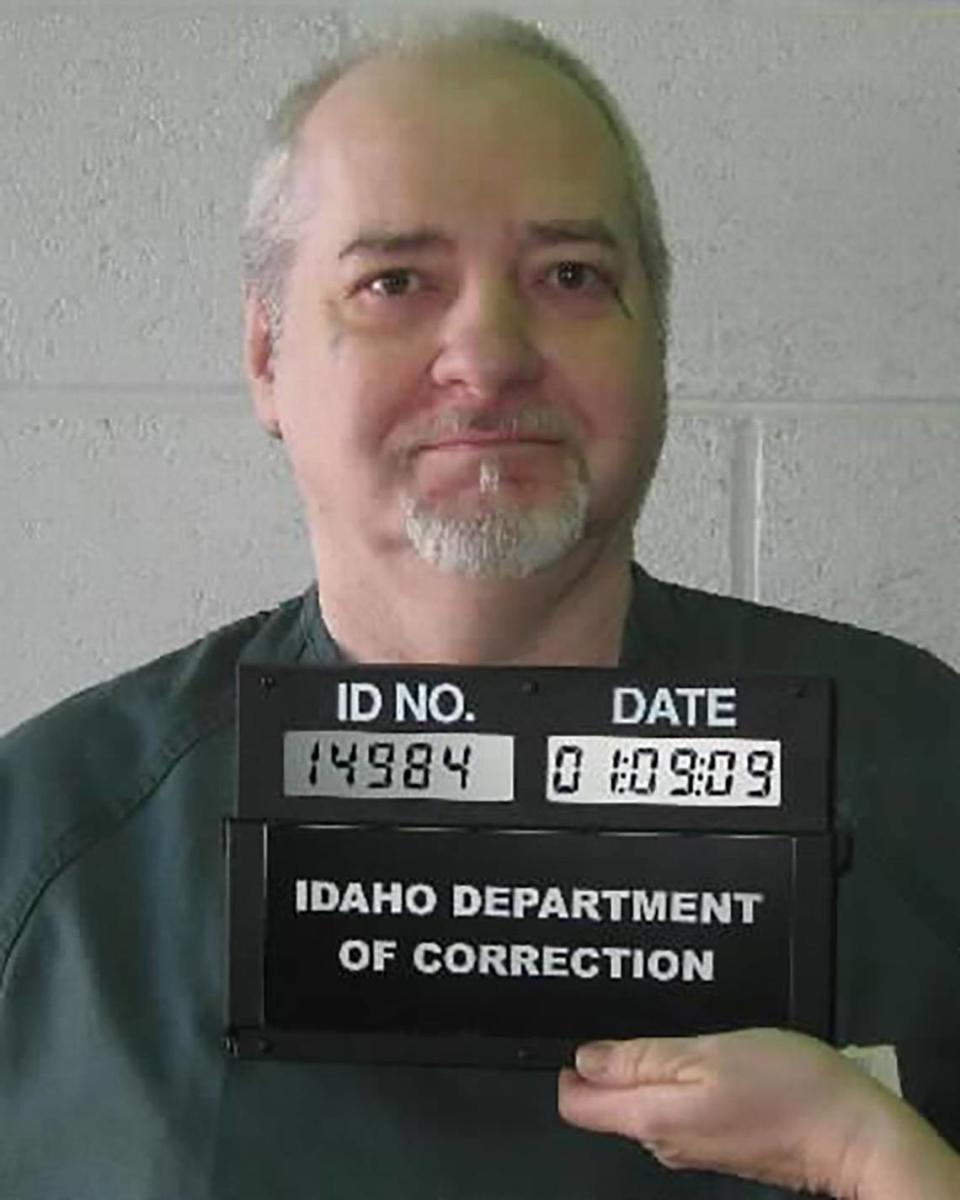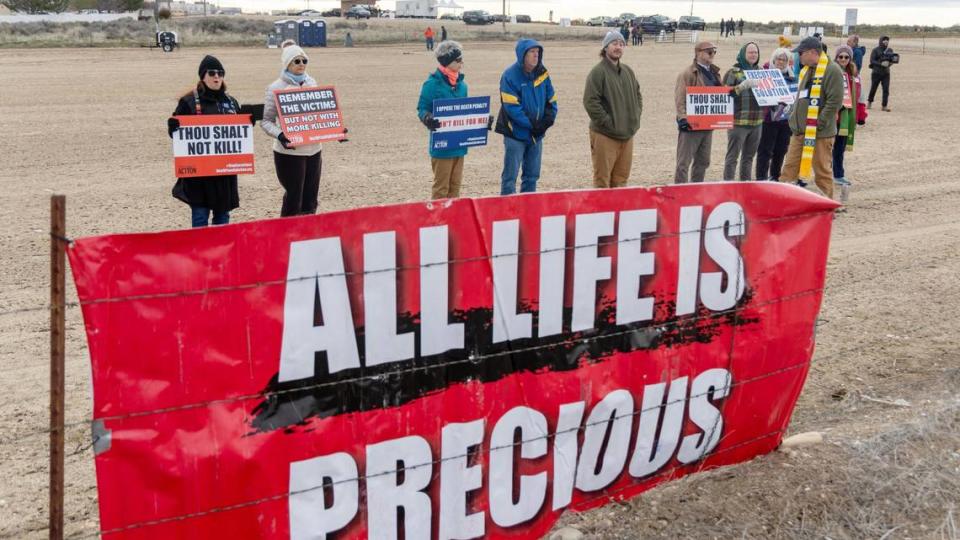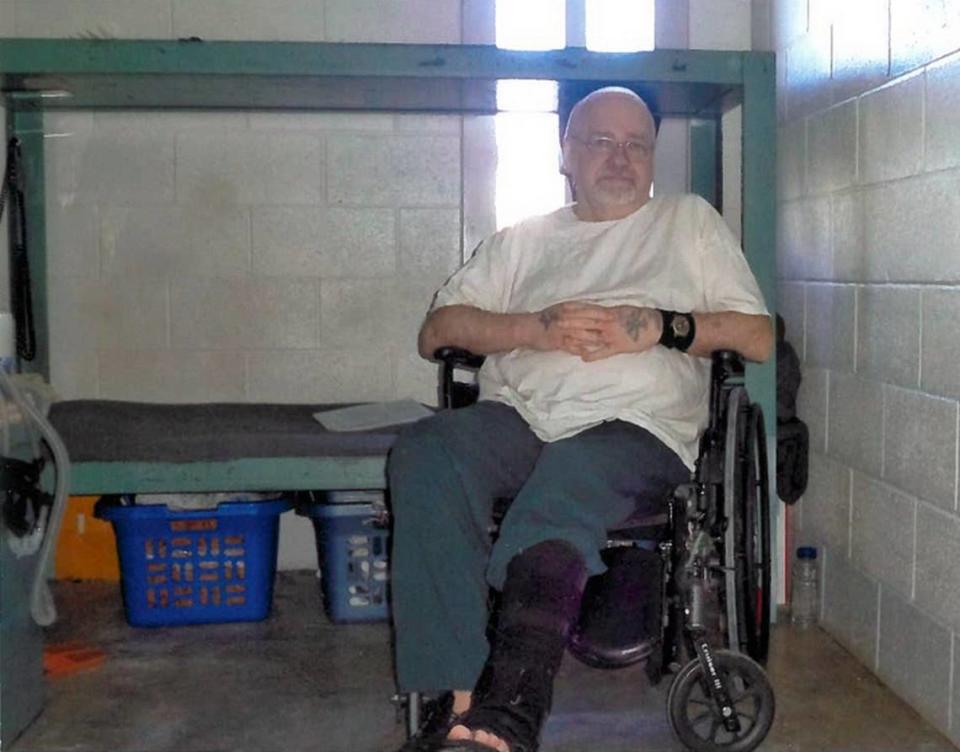Idaho’s execution of prisoner on death row halted when officials can’t establish IV line
Idaho’s attempt to execute death row prisoner Thomas Creech, 73, was halted an hour into his scheduled lethal injection after prison officials were unable to establish a vein to insert an IV, according to the Idaho prison system.
Creech’s attempted execution began at 10 a.m. and was called off at 10:58 a.m., media witnesses said. Creech’s death warrant expires just before midnight Wednesday, and it would be allowed to lapse, said Josh Tewalt, director of Idaho Department of Correction.
“At approximately 11 a.m., Director Tewalt, after consulting with the medical team leader, determined that the medical team could not establish an IV line, rendering the execution unable to proceed,” the department said in an email. “Mr. Creech will be returned to his cell and witnesses will be escorted out of the facility. As a result, the death warrant will expire. The state will consider next steps.”

Gov. Brad Little, who previously pledged that he would not intervene to stop Creech’s execution, said IDOC made the right call.
“IDOC officials are experienced and well prepared for a variety of situations that can arise during lethal injection execution,” Little said in a statement. “The team of professionals at IDOC was prepared for the possibility that medical professionals would not be able to access the inmate’s veins, a circumstance that has occurred in execution procedures elsewhere in the country.
“The competent and qualified medical professionals present and IDOC officials were cautious and did the right thing in not moving forward with the execution. My office will remain in close communication with IDOC about next steps.”
Immediately after the failed attempt to execute Creech, his attorneys with the legal nonprofit Federal Defender Services of Idaho called the unsuccessful lethal injection a “botched” execution.
“We are angered but not surprised that the state of Idaho botched the execution of Thomas Creech today,” Deborah A. Czuba, supervising attorney of the nonprofit’s unit that oversees death penalty cases, said in an emailed statement. “This is what happens when unknown individuals with unknown training are assigned to carry out an execution.”

Tewalt and media witnesses to the event said at a press conference that the execution team tried and failed eight times to access a variety of Creech’s veins. They first tried his right arm and then his right hand before moving to his left arm, and then to his left leg, witnesses stated.
“This is precisely the kind of mishap we warned the state and the courts could happen when attempting to execute one of the country’s oldest death-row inmates in circumstances completely shielded in secrecy despite a well-known history of getting drugs from shady sources,” Czuba said. “The state called Mr. Creech’s worries ‘patently absurd’ in its motions to the U.S. Supreme Court. Unfortunately, what is absurd is Idaho’s continuing efforts to kill this harmless old man, who by this point surely has suffered enough.”
Creech is the state’s longest-serving death row prisoner after nearly a half-century of incarceration and was handed his most recent death warrant — his 12th since he was imprisoned — on Jan. 30.

The U.S. Supreme Court on Wednesday morning denied each of Creech’s three remaining appeals, removing the final hurdles to his lethal injection. Each appeal made arguments that his execution would violate his constitutional rights. Justice Elena Kagan, an Obama appointee whose regional assignment includes Idaho, denied each of Creech’s requests for a stay of execution.
About two dozen anti-capital punishment protesters gathered outside the state prison complex south of Boise on Wednesday to demonstrate against Creech’s execution.
“There can be no business as usual on an execution day,” Abraham Bonowitz, co-founder and executive director of Death Penalty Action, said in a statement. “The execution of Thomas Creech is an unnecessary and wasteful expenditure of tax dollars which could be better spent providing additional services to the families of murder victims, and catching at-risk children before they fall through the cracks.”
Creech was convicted of five murders, including three in Idaho, between 1974 and 1981. He was found guilty of the November 1974 shooting deaths of Edward T. Arnold, 34, and John W. Bradford, 40, in Valley County, and later the May 1981 beating death of David D. Jensen, 23, a fellow prisoner in the maximum security prison.
Creech was later convicted of having killed a man in Oregon, and another in California. He was suspected of several other slayings and, at points, including under oath, said he killed as many as 42 people by the time he was 24 years old. Creech’s attorneys have said that number is grossly exaggerated.

Creech was sentenced to death in both Idaho cases that preceded his two out-of-state convictions, but avoided execution at least 11 times during his time in prison. The state parole board denied Creech’s request for a reduced sentence to life in prison, and the state scheduled his execution for Wednesday.
The night before, Creech spent time with LeAnn Creech, his wife of 25 years, and ate what had been expected to be his last meal, which consisted of fried chicken, mashed potatoes with gravy, corn, rolls and ice cream, according to state prison officials. Creech chose butter-pecan ice cream, The Wall Street Journal reported.
On Wednesday before the execution attempt, Creech met with his religious adviser for an hour, prison officials said. Creech remained cooperative in the days leading up to his scheduled execution, they said. He was allowed a sedative ahead of being brought into the execution chamber, Tewalt said.
Prison officials in the fall acquired the manufactured liquid pentobarbital, a powerful sedative that can stop a person’s breathing in higher doses, to use in executing Creech. They paid $50,000 for 15 grams of the drug. They have refused to identify the supplier, out of concern that doing so would hinder the state’s ability to carry out future executions.
At 10 a.m., all witnesses to Creech’s lethal injection were escorted to the execution chamber viewing area at the maximum security prison, prison officials said. Attempts to execute him began shortly after.
Three members of the execution team were dressed in blue scrubs and cap with white cloth covering their faces, except their eyes, and they wore safety glasses. They tried eight times to establish an IV. Each attempt took four to six minutes. Two attempts were made in the right arm, one in the right hand, one in the left arm and four attempts in Creech’s lower left leg.
Creech, dressed in a green prison shirt and pants and orange slip-on rubber shoes, was rolled into the execution chamber on a gurney and strapped to a mattress on a metal frame. Six corrections officers hoisted him onto the execution bed, where more straps were applied to Creech’s legs, arms and chest.
In addition to four media witnesses, the state witnesses included Attorney General Raúl Labrador and his chief of staff, Phil Skinner; Ada County Prosecutor Jan Bennetts; Ada County Sheriff Matt Clifford; Idaho Board of Correction Vice Chairman Dodds Hayden; and Jared Larsen, Gov. Brad Little’s legal counsel and policy adviser.
Idaho Statesman opinion editor Scott McIntosh, who acted as one of four media witnesses, contributed.
Who is Thomas Creech, and what crimes did he commit in Idaho and elsewhere?
Idaho bill to extend death penalty unconstitutional, aims for US Supreme Court review
Officers use pepper spray, tear gas to ‘restore order’ at Idaho maximum security prison

